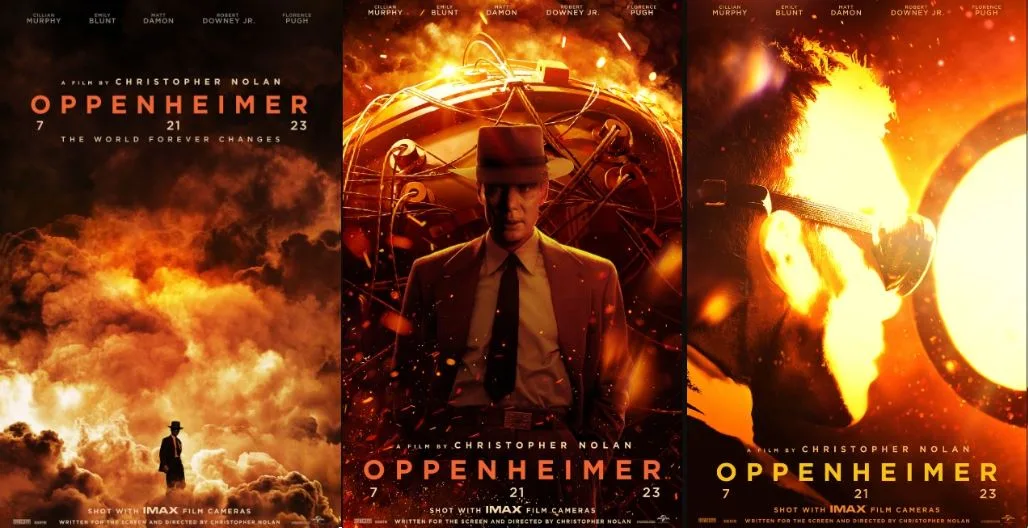

Synopsis
“Oppenheimer” is a gripping biographical thriller film, skillfully crafted by the renowned director Christopher Nolan. Inspired by the compelling 2005 biography “American Prometheus” authored by Kai Bird and Martin J. Sherwin, the movie chronicles the extraordinary life of J. Robert Oppenheimer, a brilliant theoretical physicist whose pioneering work on the Manhattan Project led to the development of the first nuclear weapons, forever changing the course of history. Cillian Murphy impeccably portrays the enigmatic Oppenheimer, alongside a stellar cast that includes Emily Blunt as Katherine “Kitty” Oppenheimer, Matt Damon as General Leslie Groves, and Robert Downey Jr. as Lewis Strauss.
Plot Outline
A Fateful Encounter
- Oppenheimer’s Cambridge Days
- A Poisoned Apple and a Life Saved

A Journey to Mastery
- Pursuing Physics at Göttingen
- Meeting Werner Heisenberg
- Returning to the United States
Love and Loss
- Jean Tatlock: A Passionate but Tragic Romance
- Finding Love in Katherine Puening

The Manhattan Project
- General Leslie Groves’ Call to Action
- Assembling the Scientific Team in Los Alamos
Nuclear Fears and Ethical Dilemmas
- Oppenheimer’s Determination to Thwart Nazi Nuclear Ambitions
- The Ethical Conundrum of the Atomic Bomb
Trinity Test and Hiroshima
- Completing the Bomb and Potsdam Conference
- A Fateful Decision: Dropping the Atomic Bombs
The Father of the Atomic Bomb
- Oppenheimer’s Guilt and Truman’s Response
The Cold War Era
- Advocating Against Further Nuclear Development
- Lewis Strauss and Oppenheimer’s Downfall
The Enrico Fermi Award
- President Johnson’s Gesture of Political Rehabilitation
- The Lingering Question of Nuclear Holocaust
Cast
| Cillian Murphy | J. Robert Oppenheimer |
| Emily Blunt | Katherine “Kitty” Oppenheimer |
| Matt Damon | Leslie Groves |
| Robert Downey Jr. | Lewis Strauss |
Writing: Nolan’s Personal Perspective
In “Oppenheimer,” Christopher Nolan takes an intimate approach, narrating the story from J. Robert Oppenheimer’s perspective. The film’s texture lies in the intricate interplay between the personal, the historic, and the geopolitical. With careful craftsmanship, Nolan weaves a cautionary tale that explores the far-reaching consequences of one man’s actions, demonstrating how choices may only reveal their full impact over time.
Delving into Oppenheimer’s complex psyche, Nolan intentionally alternates between scenes in color and black-and-white. This stylistic choice allows audiences to experience the world through Oppenheimer’s subjective lens while offering a more objective viewpoint from other characters. The film’s visual prowess extends to the visualization of Oppenheimer’s conceptions of the quantum world and waves of energy, adding depth to the narrative.
Box Office Success and Critical Acclaim
“Oppenheimer” has made an impressive impact at the box office, grossing over $180 million worldwide. Though critics laud the film’s screenplay, stellar performances, and captivating visuals, some have raised concerns regarding the portrayal of female characters. Nevertheless, the movie continues to earn accolades and recognition, with many reviewers ranking it among the best films of 2023.
Controversy
Controversies surrounding sex scenes in movies, television shows, or other forms of media are quite common. When such scenes are included in entertainment and religious content, like the Bhagavad Gita, a sacred book of Hindus, they often become subjects of intense scrutiny, debates, and varying opinions. The controversy can arise due to several reasons, including cultural, social, and ethical factors.
Sex scenes can be seen as provocative or explicit, raising concerns about their appropriateness for certain audiences, especially children or conservative communities. Some argue that such content can have a negative impact on society’s moral fabric, promoting objectification or unrealistic expectations regarding intimate relationships.
On the other hand, proponents of including sex scenes in media argue that they can serve artistic or narrative purposes. They add depth and authenticity to characters and relationships. They believe that mature themes are essential in reflecting real-life experiences and emotions. Censorship could compromise creative expression of filmmakers and storytellers.
The debate often revolves around finding a balance between artistic freedom and responsible content creation. Filmmakers may face pressure from both sides of the argument, leading to self-censorship or edits to appease certain audiences or avoid potential backlash.
In conclusion, sex scenes in media will continue to be a contentious topic, as they challenge societal norms and values, particularly when it involves religious or sacred content like the Bhagavad Gita. Acknowledging the diversity of opinions and finding common ground will be crucial in fostering constructive discussions about the portrayal of intimacy in entertainment content. Some believe that avoiding such scenes could enhance a work’s artistic merit and potentially lead to prestigious awards like the Oscars.
Conclusion
“Oppenheimer” is more than a cinematic masterpiece; it’s a thought-provoking exploration of a man’s brilliance and the ethical dilemmas that define his legacy. As Cillian Murphy’s compelling portrayal brings Oppenheimer to life, audiences are confronted with the profound consequences of groundbreaking discoveries. Christopher Nolan’s intimate narrative style draws viewers into the heart of history, urging us to ponder the far-reaching implications of our actions.
Unique FAQs After The Conclusion
- Q: Is “Oppenheimer” based entirely on historical facts?
- A: While the film draws inspiration from real events and Oppenheimer’s life, it also employs artistic liberties to craft a compelling narrative.
- Q: Did J. Robert Oppenheimer truly leave a poisoned apple for Patrick Blackett?
- A: There is no historical evidence to support this event; it is likely a fictional element added for dramatic effect.
- Q: What sets “Oppenheimer” apart from other biographical films?
- A: Christopher Nolan’s unique approach to storytelling and the use of color and black-and-white scenes provide a fresh perspective on historical events.
- Q: How accurate is Cillian Murphy’s portrayal of Oppenheimer?
- A: Cillian Murphy’s performance has been widely praised for its authenticity and depth, capturing the essence of Oppenheimer’s character.
- Q: Will “Oppenheimer” have a sequel or related projects?
- A: As of now, there are no official plans for a sequel or related projects, but the film’s success may influence future developments.




